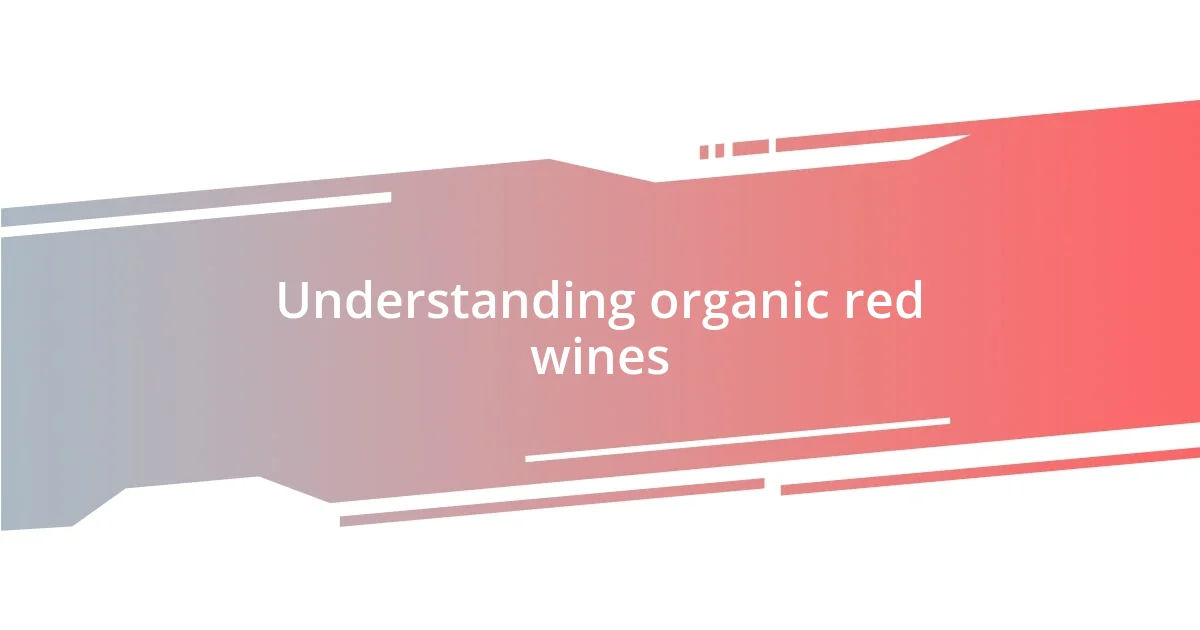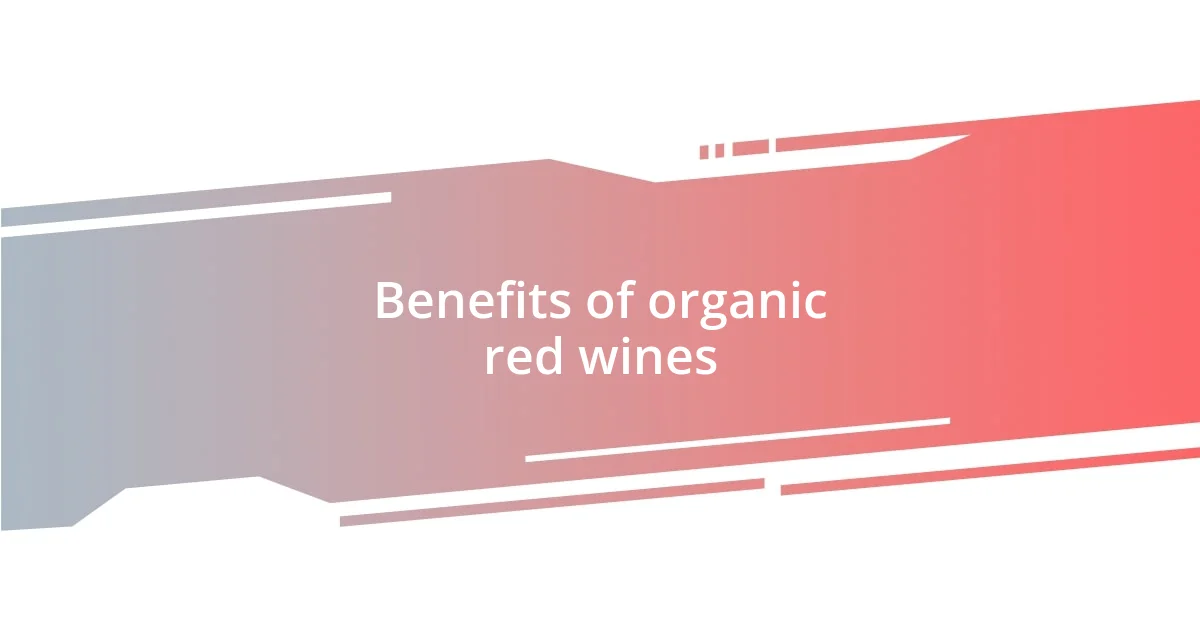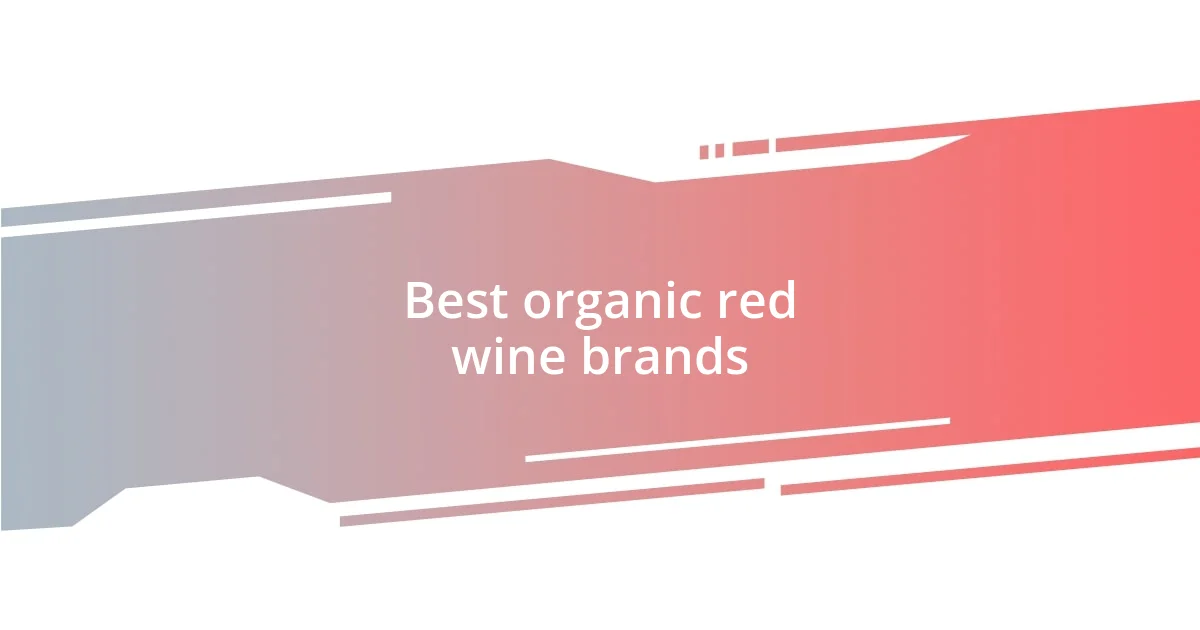Key takeaways:
- Organic red wines are produced without synthetic fertilizers or pesticides, enhancing the authentic flavors and connection to the land.
- Benefits include superior flavor profiles, a mindful approach to sustainability, and potential health advantages due to lower sulfite levels.
- Top recommended organic brands, like Frog’s Leap, Bonterra, La Clarine Farm, and Domaine de la Côte, exemplify craftsmanship and sustainable practices, enriching the wine experience.

Understanding organic red wines
Organic red wines are made from grapes that are grown without synthetic fertilizers or pesticides. I remember the first time I savored a glass; the freshness and purity of the flavors were so distinct compared to conventional wines. What I found fascinating is how the absence of harsh chemicals allows the true essence of the grape to shine through, offering a more authentic taste experience.
When I think about organic red wines, I can’t help but reflect on the deeper connection to the land they represent. Each sip feels like a narrative, weaving the soil, climate, and natural farming practices into my experience. Have you ever pondered how much the growing method affects the flavors? In my experience, it’s like being taken on a journey with every bottle—something I’ve come to appreciate more with each tasting.
The regulations surrounding organic wines can be stringent, requiring growers to adhere to specific standards. This commitment to quality often results in richer, more complex profiles, which I find utterly rewarding. Additionally, the stories behind these wines—the passionate growers, the unique terroirs—add an extra layer of richness to each pour, making it more than just a beverage but a window into the world of organic agriculture.

Benefits of organic red wines
Organic red wines offer numerous benefits that enhance not just the tasting experience but also the overall enjoyment of wine culture. One of the standout advantages, in my experience, is the superior flavor profile. I recall attending a small organic wine tasting—it was enlightening to realize how much the flavors varied compared to conventional wines. I could taste the terroir, the unique characteristics of the land, and the grape varieties without the interference of synthetic additives. It’s a true testament to how nature can produce something extraordinary when left to its own devices.
Moreover, drinking organic red wines often comes with a sense of mindfulness. I’ve felt a deeper appreciation for the environment knowing that these wines are produced with sustainable practices in mind. The growers I’ve met emphasize their commitment to preserving biodiversity, and this awareness has shaped my choices. Have you ever felt that emotional connection when supporting eco-friendly products? It changes the way we indulge in our favorites, transforming what was once a simple enjoyment into an ethical choice.
Another advantage lies in the potential health benefits. Organic wines generally have lower levels of sulfites, which can often lead to fewer headaches the next day. I can personally attest to this; after enjoying a night of organic red wine, I woke up feeling refreshed rather than fuzzy-headed. This aspect has certainly influenced my preferences. Knowing I can indulge without the dreaded aftereffects adds to the pleasure of each sip.
| Benefit | Description |
|---|---|
| Superior Flavor | Organic wines highlight true grape essence without synthetic additives. |
| Mindful Enjoyment | Supports sustainable farming practices, connecting consumers with the environment. |
| Health Benefits | Lower sulfite levels can lead to fewer hangover symptoms. |

Best organic red wine brands
It’s hard to overstate how much I appreciate the craftsmanship behind some of the best organic red wine brands. Names like Frog’s Leap and Bonterra stand out to me—not just for their commitment to organic practices but for their remarkable flavor profiles. I remember sharing a bottle of Bonterra’s Zinfandel with friends one evening; its boldness and vivid fruit flavors sparked lively conversation, something I find is often missing with more conventional wines.
Another brand I can’t recommend enough is La Clarine Farm. When I first tasted their Syrah, it was a revelation. The complexity of flavors transported me, revealing layers of dark fruit intertwined with earthy undertones. Every sip felt like a new discovery. Have you ever been surprised by how a single bottle can change your perception of wine? La Clarine Farm does just that—by focusing on small-batch production, they truly showcase the essence of their terroir.
Lastly, there’s the vibrant essence of Domaine de la Côte. The commitment to sustainable practices resonates deeply with me, especially when I think about the future of our planet and what we leave for generations to come. I once visited their vineyard, and it felt almost sacred, being surrounded by such dedication to the land. It isn’t just about the wine; it’s about nurturing a relationship with nature that we all have a stake in. Wouldn’t you agree that brands aligning with sustainable ideals can elevate our enjoyment and deepen the story behind our glass?















